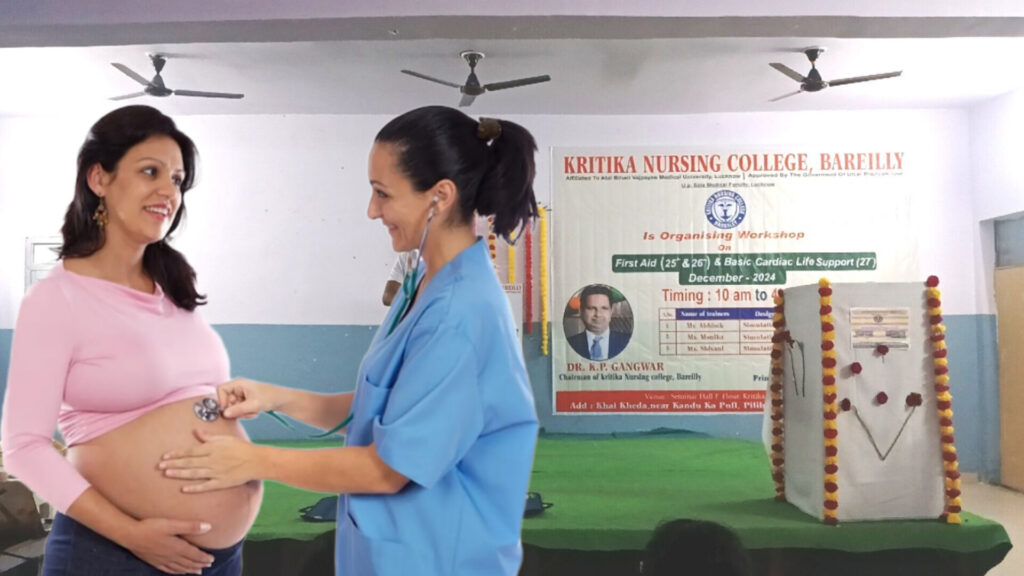
🌸 Unit-4 | Chapter-10: Antenatal Care 🌸
🔹 Definition of Antenatal Care
Antenatal Care is the systematic and regular supervision of a pregnant woman from the time of conception until the onset of labor.
It includes observation, medical check-ups, health education, and preventive measures to ensure the health of the mother and fetus.
🎯 Objectives of Antenatal Care
- To ensure the birth of a healthy baby from a healthy mother.
- To identify and manage high-risk pregnancies.
- Early detection and treatment of complications during pregnancy.
- Promote safe and institutional delivery.
- Reduce maternal and infant mortality rates.
- Provide health education on pregnancy, delivery, newborn care, and family planning.
✅ WHO Guidelines: Minimum 4 Antenatal Visits
| Visit No. | Time |
|---|---|
| 1st Visit | Up to 12 weeks |
| 2nd Visit | 24-26 weeks |
| 3rd Visit | 28-32 weeks |
| 4th Visit | Up to 36 weeks |
📋 Key Components of Antenatal Care
1. History Collection
- General Information:
- Name, Age, Address, Religion, Occupation
- Husband’s Name, Duration of marriage, Present complaints
- Menstrual History:
- LMP (Last Menstrual Period), cycle, pain, flow
- Obstetrical History (GTPAL):
- G – Gravida (no. of pregnancies)
- T – Term deliveries
- P – Preterm deliveries
- A – Abortions
- L – Living children
- Past Medical & Surgical History:
- Any previous illness, surgery, chronic disease
- Present Pregnancy History:
- Complications (e.g. bleeding, pain), immunization, antenatal visits
🧪 Examinations during Antenatal Care
A. General Examination
- Nutritional status: Good / Average / Poor
- Height and weight
- Skin color
- Neck examination (for thyroid)
- Breast examination
- BP, Pulse, Temperature, Respiration
- Varicose veins, Swelling (edema)
B. Obstetrical Examination
- Abdominal inspection: shape, scars, uterine height
- Fundal height
- Leopold’s maneuvers
- Bimanual and Speculum Examination
- Cervical smear (if needed)
C. Laboratory Tests
- Blood Tests: Hb, Blood group, Rh factor, VDRL, HIV, Blood sugar
- Urine Tests: Sugar, Protein, Pus cells, HCG
- ELISA test
- Ultrasound (USG)
- X-ray or Doppler (only if necessary)
💡 Antenatal Advice (Counseling)
📌 Objectives:
- Prepare the woman physically, emotionally, and psychologically for safe delivery.
🧷 Key Points:
- Diet & Nutrition:
- Balanced diet with proteins, vitamins, iron, and folic acid
- Eat small frequent meals
- Start Iron + Folic Acid tablets after 20 weeks
- One multivitamin tablet daily (if advised)
- Rest:
- 2-3 hours rest during the day
- 8-10 hours sleep at night
- Prefer sleeping on the left side
- Personal Hygiene:
- Daily bath, clean clothes, oral hygiene
- Genital hygiene, cleaning of axilla and perineum
- Hair and nail care
- Clothing & Footwear:
- Loose, clean, and comfortable clothes
- Avoid tight clothing and high-heeled shoes
- Breast Care:
- Daily cleaning of breasts and nipples
- Practice Breast Self-Examination
- Gently pull inverted nipples outward daily (if present)
- Warning Signs (Teach to report immediately):
- Swelling of hands, face, feet
- Severe headache or blurred vision
- High BP (≥140/90 mmHg)
- Bleeding per vagina
- Decreased fetal movement
- Seizures
- Severe anemia or weakness
💉 Immunization During Pregnancy
| Vaccine | Time | Dose | Route |
|---|---|---|---|
| TT-1 | At 16-18 weeks (or as early as pregnancy is detected) | 0.5 ml | IM (Intramuscular) |
| TT-2 | 1 month after TT-1 | 0.5 ml | IM |
📘 Conclusion
Antenatal care plays a vital role in ensuring the safety and health of both mother and baby. It helps in early detection of risks, timely intervention, and creates awareness among pregnant women about self-care, delivery, and newborn care.
